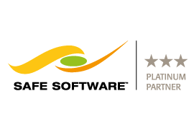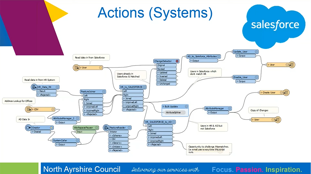Thinking outside the spatial box in Scotland


North Ayrshire’s innovative approach to FME puts Council ahead of the game
Introduction
Automating back-office data processes with FME is delivering significant benefits for North Ayrshire Council, demonstrating an ingenious and creative approach to problem-solving beyond the traditional realms of FME’s use.
“North Ayrshire’s unprecedented use of FME in managing non-geographic data has established it as an FME trailblazer among the global user community. By identifying innovative new ways to automate Human Resources tasks and of applying FME to rapidly develop creative solutions, it is delivering significant benefits and providing inspiration across Scotland and beyond.” David Eagle, FME Division Manager, 1Spatial UK 
Challenge
North Ayrshire Council holds a huge amount of data, particularly in its HR system which contains records relating to its 8,000 strong workforce. Whether relating to new starters, leavers or those moving jobs, each employee’s journey impacts on its operations – from the allocation of equipment and licences, to verifying contracts, issuing security access and updating the staff directory.
With different departments responsible for providing updates, the information was not as joined-up, consistent or accessible as it could be. It was clear there was an opportunity to centralise and enrich the existing datasets to deliver more value.
Solution
Having used FME for spatial data integration and a mobile working platform for the Streetscene open space maintenance service; a programme of work to protect and enhance the built and green environment, the Council’s GIS and Data Analytics team recognised that its automation capabilities could be transferred to manage non-spatial information too. FME offered a low-code alternative to Python that did not need to be embedded deeply into existing infrastructure creating flexibility should changes be required in the future.
 1Spatial provided the FME licences and private training to support the Council in the initial stages of the project and help them quickly realise the benefits. On-going technical support is also available to the team, when needed.
1Spatial provided the FME licences and private training to support the Council in the initial stages of the project and help them quickly realise the benefits. On-going technical support is also available to the team, when needed.
“Using FME to automate and integrate our non-spatial data has enabled us to meet service needs quickly and accurately by providing a versatile, visual solution to the change management and sharing of Council data.” Dyllan North, Senior Technology Officer - GIS & Analytics, North Ayrshire.
The automation process begins by interrogating the HR data using the SQLCreator transformer in an FME Workspace to identify key changes in the employee records. This process is hosted on North Ayrshire’s Production FME Server platform and the Workspace then determines the actions to be triggered. For example, IT resource requests for a new starter, revoking licences and security passes for leavers, ensuring staff moving within the Council have access to the data and applications they need, and more general updates such as new locations and job titles are just some of the capabilities of the solution.
Common fields enable the data to be automatically matched to the HR record, identifying discrepancies that may need to be corrected. Changes are replicated automatically throughout the Council’s systems, triggering emails to the relevant people when a specific action, such as deactivating accounts and licences, is required. Furthermore, a ‘cheat sheet’ developed by the GIS and Data Analytics team capitalises on the existing data structure by enabling rapid bulk updates. When a change to all records (either Council-wide or by department) is required, the tagged data will show as a discrepancy which is addressed in the data run.
This hands-off approach reduces the opportunity for discrepancies and misunderstandings, whilst dramatically improving response times and delivering cost-savings.
 By linking the centralised database to applications, such as Microsoft Office 365 and the Salesforce.com CRM system, the Council has enriched the information available to staff. For example, joining up the HR system with the staff directory has allowed photos and office locations, in addition to full names, positions and departments, to be accessed in one place; an aid to security and engagement. As the changes are automatic, staff can be confident that the directory is always up to date. Furthermore, the corporate management structure on the HR system is used to link O365 profiles which allows for full utilisation of the O365 Organisation Charts making it easier to find people and teams.
By linking the centralised database to applications, such as Microsoft Office 365 and the Salesforce.com CRM system, the Council has enriched the information available to staff. For example, joining up the HR system with the staff directory has allowed photos and office locations, in addition to full names, positions and departments, to be accessed in one place; an aid to security and engagement. As the changes are automatic, staff can be confident that the directory is always up to date. Furthermore, the corporate management structure on the HR system is used to link O365 profiles which allows for full utilisation of the O365 Organisation Charts making it easier to find people and teams.
Benefits
- Increases operational efficiency by automating and streamlining processes.
- Delivers cost savings through better licence management, reducing administration tasks.
- Systems are more effectively linked without the need for complex code and instead actions on the data are triggered by ‘events’, such as a new member of staff joining the council.
- Reduces risks by ensuring security and IT access is issued only to current employees.
- Provides confidence in accuracy and consistency of Council data with a tracked record of changes.
- Enables greater insight into Council’s data holdings to drive improvements in services.
- Promotes trust by enabling greater transparency and accountability.

